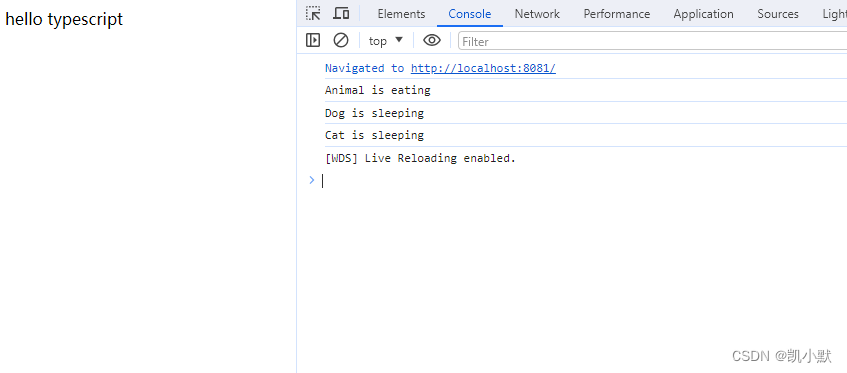11 # 类:抽象类与多态
发布时间:2024年01月15日
抽象类
抽象类是不允许被实例化的,只能被继承
abstract class Animal {
}
let animal = new Animal(); // 错误: 不能创建一个抽象类的实例
class Dog {
constructor(name: string) {
this.name = name;
}
name: string;
run() {}
}
let dog = new Dog('Tom');
抽象类的好处就是可以抽离出一些事物的共性,有利于代码的复用和扩展,另外抽象类也可以实现多态。
多态
所谓多态,就是在父类中定义一个抽象方法,在多个子类中对这个方法有不同的实现,在程序运行的时候,会根据不同对象执行不同的操作,这样就是实现了运行时的绑定。
abstract class Animal {
// 方法复用
eat() {
console.log('Animal is eating');
}
// 不指定方法具体实现,构成一个抽象方法
abstract sleep(): void;
}
// let animal = new Animal(); // 错误: 不能创建一个抽象类的实例
class Dog extends Animal {
constructor(name: string) {
super(); // 调用父类的构造函数
this.name = name;
}
name: string;
run() {}
sleep() {
console.log('Dog is sleeping');
} // 实现抽象方法
}
let dog = new Dog('Tom');
dog.eat(); // 输出: Animal is eating
class Cat extends Animal {
sleep() {
console.log('Cat is sleeping');
} // 实现抽象方法
}
let cat = new Cat();
let animals: Animal[] = [dog, cat];
animals.forEach(a => a.sleep()); // 输出: Dog is sleeping, Cat is sleeping

this 类型
类的成员方法可以直接返回一个 this,这样就可以很方便的实现链式调用。
class WorkFlow {
step1() {
return this;
}
step2() {
return this;
}
}
new WorkFlow().step1().step2(); // 链式调用
在继承的时候,this 的类型也可以表现出多态,这里的多态是指 this 既可以是父类型,也可以是子类型。
class WorkFlow {
step1() {
return this;
}
step2() {
return this;
}
}
new WorkFlow().step1().step2(); // 链式调用
class MyFlow extends WorkFlow{
next() {
return this;
}
}
new MyFlow().next().step1().next().step2();
文章来源:https://blog.csdn.net/kaimo313/article/details/135610025
本文来自互联网用户投稿,该文观点仅代表作者本人,不代表本站立场。本站仅提供信息存储空间服务,不拥有所有权,不承担相关法律责任。 如若内容造成侵权/违法违规/事实不符,请联系我的编程经验分享网邮箱:chenni525@qq.com进行投诉反馈,一经查实,立即删除!
本文来自互联网用户投稿,该文观点仅代表作者本人,不代表本站立场。本站仅提供信息存储空间服务,不拥有所有权,不承担相关法律责任。 如若内容造成侵权/违法违规/事实不符,请联系我的编程经验分享网邮箱:chenni525@qq.com进行投诉反馈,一经查实,立即删除!
最新文章
- Python教程
- 深入理解 MySQL 中的 HAVING 关键字和聚合函数
- Qt之QChar编码(1)
- MyBatis入门基础篇
- 用Python脚本实现FFmpeg批量转换
- 代码随想录算法训练营第二十九天| 491.递增子序列、46.全排列、47.全排列 II
- vue3+ts 中实现压缩图片、blob 转 base64
- 【数据结构】顺序表与单链表的增删查改
- 装饰 Web3 项目的用户交互界面(Web3项目二实战之四)
- 鸿蒙原生应用/元服务开发-Stage模型能力接口(七)
- flume案例
- Mac中安装JDK1.8和JDK11双版本并任意切换
- 数据库并发事务和隔离级别
- 项目联系 Spring Boot + flowable 快速实现工作流
- .net8时代,微软.net开发策略,F#不就是VB语言吗?